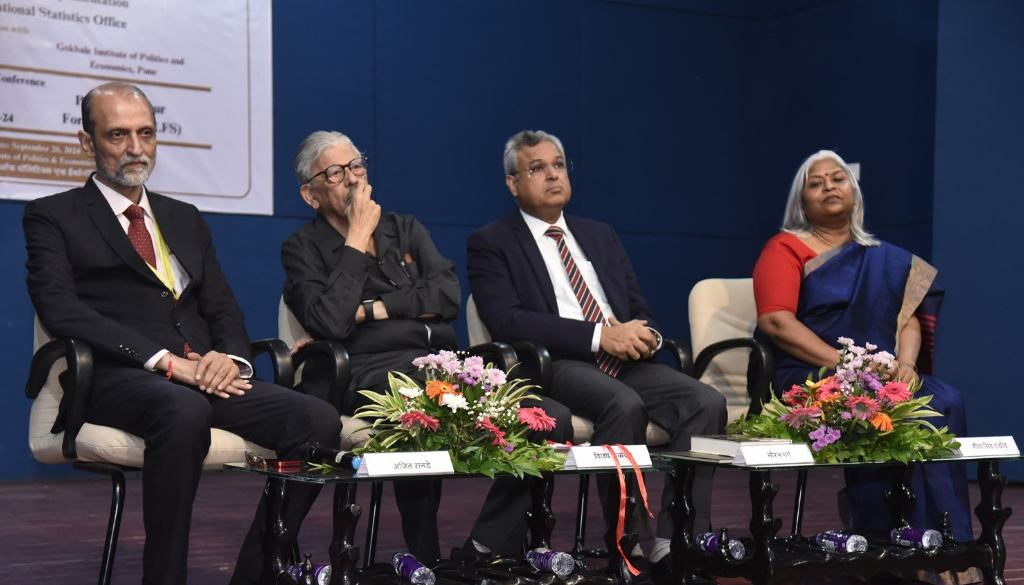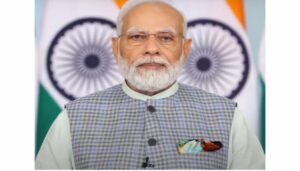National Statistics Office Hosts Data User Conference on Periodic Labour Force Survey in Pune

Pune, 26th September 2024: The National Statistics Office (NSO) under the Ministry of Statistics & Programme Implementation (MoSPI) convened a Data User Conference focused on the Periodic Labour Force Survey (PLFS) for 2023-24 at the Gokhale Institute of Politics and Economics (GIPE) today. The event attracted approximately 150 attendees, including representatives from various Central Ministries, academic institutions, international organizations, and members of the public who registered online. Additionally, about 2,200 participants joined via a live YouTube stream.
Dr. Vijay Kelkar, a distinguished economist and former president of the Indian Statistical Institute, served as the Chief Guest for the conference. Opening remarks were delivered by Dr. Saurabh Garg, Secretary of MoSPI, while Dr. Ajit Ranade, Vice Chancellor of GIPE, provided a special address. The conference also saw participation from senior officials within MoSPI and various ministries, along with representatives from key international organizations.
Ms. Geeta Singh Rathore, Director General of the National Sample Survey (NSS) at MoSPI, welcomed the attendees and highlighted the PLFS’s vital role in generating data that directly affects people’s lives, especially regarding employment and inclusive growth. She emphasized the importance of collaborative efforts in utilizing this data for informed decision-making and strategic planning.
In his opening address, Dr. Saurabh Garg underscored the significance of technology in enhancing the survey’s reach and effectiveness. He discussed the implementation of the computer-assisted personal interviewing (CAPI) method under the E-Sigma platform, which allows real-time data access linked to the cloud. He also mentioned the importance of an upcoming survey focused on private corporate sector capital expenditure (CAPEX) investment intentions, aligning with the goal of a developed India. Dr. Garg stressed the necessity of using data to drive development, particularly in increasing the female labor force participation rate. He advocated for partnerships with institutions and academia, suggesting the establishment of data innovation labs where MoSPI can collaborate with various survey agencies. He also introduced the newly launched eSankhyiki portal, which aims to centralize access to essential national statistical data.
In his special address, Shri Ajit Ranade highlighted the importance of data in shaping economic research and policy. He pointed out that while the economy is growing, the challenge remains in generating high-quality jobs. He emphasized that understanding labor data is crucial for analyzing income opportunities and job creation, especially in the context of the expanding gig economy.
Chief Guest Dr. Vijay Kelkar emphasized the strategic role of the PLFS in guiding employment policies and labor reforms. He also discussed the challenges posed by climate change and advocated for the integration of Green GDP metrics to better assess the sustainability of economic activities. Dr. Kelkar urged state governments to tackle underemployment issues and highlighted the potential of Public-Private Partnerships (PPP) in enhancing productivity and innovation.
The conference included two technical sessions that focused on “Survey Instruments and Key Results” and “Understanding Unit Level Data for Tabulation Using Multiplier & Data Quality Enhancement.” A panel discussion titled “Enhancing Stakeholder Engagement through Data” examined the practical application of PLFS data across various sectors. The panelists emphasized the importance of clear communication regarding survey findings and collaborative approaches to ensure data users, from policymakers to researchers, can effectively utilize PLFS insights. They also discussed the integration of data into robust Management Information Systems (MIS) and the need for high-frequency data collection to capture real-time employment dynamics.
Interactive sessions provided a platform for open dialogue, allowing attendees to ask questions and share insights regarding the PLFS results. The Q&A segment was particularly engaging, with students inquiring about district-level estimates, access to unit-level data, and criteria for survey stratification.
The conference concluded with a renewed commitment to utilizing PLFS data for the development of effective, evidence-based labor policies. Participants recognized that ongoing communication between data producers and users is essential for maximizing the survey’s impact on policy formulation and socio-economic development.
For further details on the PLFS 2023-24 report and access to unit-level data, please visit the MoSPI website at www.mospi.gov.in.





